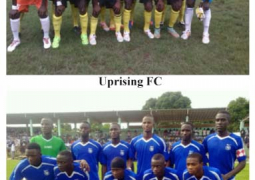“The
president-elect of the Republic of the Gambia, Adama Barrow.” Say it once more.
“The president-elect of the Republic of the Gambia, Adama Barrow.” And again
and again. No matter how many times you repeat the words, it will probably take
some time before the reality truly sinks in. Simply extraordinary, isn’t it?
Where we had expected, perhaps unjustifiably, an exit with a destructive bang,
we had instead, an entrance with a dignified and nation-redeeming whimper. The
most resonant whimper in our political history.
The ‘wind of change’ had been wafting in the
air for some time, and when it finally broke through the airwaves, on 2nd
December 2016, we received it as one might receive a guest, an eagerly-awaited
guest: we flocked to the streets in a spontaneous and infectious euphoria, feet
stomping, hands waving, and voices, long castrated, regained their proud
timbre, and screamed to their hearts’ content, in complement to the honking
vehicles streaming past. But not even
the leaping merriment could hide the wary bewilderment on people’s faces. “Is
this really true, is it not a sick ‘April fool’s’ joke? The unnerving
uncertainty formed a nagging backdrop to the festive charge in the air. But as
evening beckoned, our fears diminished – it seemed we had crossed an epochal
Rubicon!
The
riot squads parade the avenues like lion prides testing their sinews
and
every trembling heart retires as evening falls crushed by the weight of hours
till daylight comes.
Daylight
broke for this slow-moving scorpion on the 3rd Dec, when we woke up to no riot
squads, no sinew-testing uniformed functionaries, to choke the heart or crush
the spirit. We had indeed woken up to a new dawn. The ‘impossible’ had
happened, we had just escaped an ‘Alcatraz’, and people can now ‘exhale’, the
waiting (patience?) had paid off. Never again, that servile watchfulness, which
made us look over our shoulders before we opened our mouths to speak, worrying
about whom to trust, or whether one’s conversation was being secretly recorded.
No more intimidatory check-points, arbitrary arrests, or indeed singing for our
supper. Never again should we allow ourselves to be in the sort of toxic
atmosphere where one was forced to fudge, hedge, and trim our views to please
the caprices of narrow and unsalubrious egotisms.
Fast-forward
to 5th December, around 6pm, and should you find yourself on Kairaba Avenue,
you would have seen the crowds that had come out to welcome Ousainou Darboe,
following his bail-release by the Court of Appeal. The atmosphere was carnivalesque,
and the queue stretched from the American Embassy to Westfield. It felt, for
me, as though the Notting Hill Gate carnival of London had come to Kairaba
Avenue: a carnival of liberation, an event that stands in noble judgement of
what I call “the battle of Kairaba Avenue”, the state’s sickening show of
sinews on harmless marchers on the same avenue on 16th April this year. “The
Gambia’s Nelson Mandela is free”, screamed a happy voice, and his sentiment
could be taken as the sententia of the occasion. My mind went straight to
William Wordsworth’s poem, “Bliss was it in that dawn to be alive/But to be
young was very heaven”. We are a country in romance.
All
this romance will, of course, come with its baggage of expectations, some of
which will be obvious and realistic, and others will range from the obviously
barmy and to the utopian. Sooner or later, disappointments will come, and
discouragements about the pace of change, or even ‘betrayals’ of some of the
ideals of the struggle. But that’s the nature of democracy: its progress is
gradual, piecemeal and imperfect. Politics, like life, is a crooked timber out
of which nothing straight can be wrought. We will argue and argue and argue. We
will fall out with one another, make up again, debate a bit more, perhaps
change our minds or harden our positions, fall out again, make up again – you
get the picture.
But
you’d have noticed that what allows the debate, the disagreements, fallings
out, and so on, is essentially a ‘process’. An open process that is big enough
to accommodate dissenters. Under the first Republic, our ‘process’ was as good
as anything that Africa had to offer. So when 22nd July 1994 happened I was
gobsmacked at how quickly we had welcomed what was essentially a travesty of
process. No one had ever complained that Jawara rigged elections or that there
was electoral unfairness, somehow. But for some reason, we opened our arms to
people who had crept in through the window as if they had walked in through the
door. No wonder, in the end, we were up in arms to get rid of them. Quite
clearly, history was not on our side: military governments have caused more
damage than good to Africa’s political evolution.
So
what made us embrace them so swiftly? I will suggest that political naivete
made us do it. And this naivete became our baptism, our twenty-two year old
baptism of fire. “No pain, no gain”, an American might say, and perhaps this
was the sort of experience we needed, to remind us of what was significant,
valuable and godly in man, in both the political and social realms of our
existence. There should not be any bitterness – only understanding; no revenge,
but justice; no looking back, but forward. Let us tune the experience to
melody, to effect, to love.
This
ought to be a revolution of political culture no less than one of conscience.
We are so quick to jump on the wagon of present power. Quite soon, we will be
spectators to a tour-de-France of back pedaling on political allegiances, or
‘more about-faces than a battalion parade ground’. But so is the way of the world: opportunism
will trump principles each time. The new
leadership has a ‘hard row to hoe’. They will need the brightest and the best
of Gambia, to even begin. But how quickly we will steer our way out of the
current mess will depend on the leadership style. It is said of Abraham Lincoln
that, when America was going through very difficult times, he steered the ship
of state ‘as the pilots on his western rivers steered: from point to point,
setting the course of the boat no farther than they can see’. We astonished the world with our ‘velvet
revolution’; we can do it again with our recovery.
Author: Momodou Alieu Sidi M’boge



